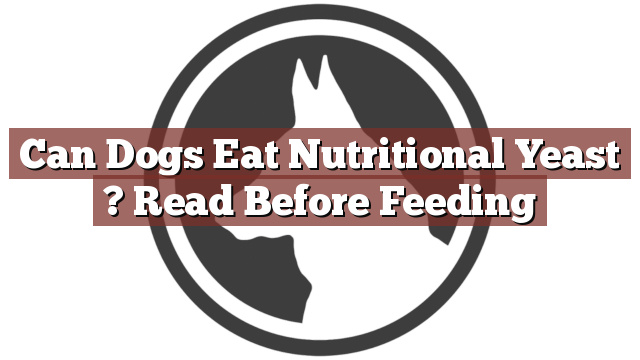Understanding Your Dog’s Dietary Needs
As a responsible pet owner, it is crucial to understand your dog’s dietary needs. Providing a balanced and nutritious diet is essential for their overall health and wellbeing. While dogs primarily require a diet rich in animal protein, they can also benefit from certain plant-based foods. However, it is important to be cautious about what human foods you introduce into their diet, as some may be harmful to dogs.
Can Dogs Eat Nutritional Yeast? Read Before Feeding
Can dogs eat nutritional yeast? Before including this ingredient in your dog’s diet, it is important to consider the potential benefits and risks. Nutritional yeast is a type of deactivated yeast that is commonly used as a dietary supplement for humans. It is a rich source of vitamins, minerals, and protein. Many people enjoy adding nutritional yeast to their meals for its cheesy flavor and nutritional benefits. However, when it comes to dogs, it is essential to exercise caution.
Pros and Cons of Feeding Nutritional Yeast to Dogs
Pros: Nutritional yeast can offer certain benefits to dogs. It is a great source of B-vitamins, which help support your dog’s metabolism and overall energy levels. Additionally, it contains essential amino acids that are important for muscle growth and repair. Nutritional yeast is also rich in minerals like zinc and selenium, which contribute to a healthy immune system. Some dog owners even claim that adding nutritional yeast to their dog’s diet can help improve their coat’s shine and overall skin health.
Cons: While nutritional yeast can provide some benefits, it is not suitable for all dogs. Dogs with certain health conditions, such as yeast allergies or sensitivities, should avoid consuming nutritional yeast. Additionally, the high fiber content in nutritional yeast can cause digestive issues in some dogs, leading to symptoms like diarrhea or gas. It is always recommended to consult with your veterinarian before introducing any new food or supplement into your dog’s diet to ensure it is safe and appropriate for them.
Conclusion
In conclusion, dogs can eat nutritional yeast in moderation, provided they do not have any underlying health conditions or sensitivities. It can be a beneficial addition to their diet, as it offers various vitamins, minerals, and protein. However, it is essential to consult with your veterinarian before incorporating nutritional yeast into your dog’s meals. They can guide you based on your dog’s individual needs and provide recommendations on appropriate portion sizes. Remember, the key to a healthy diet for your furry friend lies in balance and moderation.
Thank you for taking the time to read through our exploration of [page_title]. As every dog lover knows, our furry friends have unique dietary needs and responses, often varying from one canine to another. This is why it's paramount to approach any changes in their diet with caution and knowledge.
Before introducing any new treats or making alterations to your dog's diet based on our insights, it's crucial to consult with a veterinarian about [page_title]. Their expertise ensures that the choices you make are well-suited to your particular pet's health and well-being.
Even seemingly harmless foods can sometimes lead to allergic reactions or digestive issues, which is why monitoring your dog after introducing any new food item is essential.
The content provided here on [page_title] is crafted with care, thorough research, and a genuine love for dogs. Nevertheless, it serves as a general guideline and should not be considered a substitute for professional veterinary advice.
Always prioritize the expert insights of your veterinarian, and remember that the health and happiness of your furry companion come first.
May your journey with your pet continue to be filled with joy, love, and safe culinary adventures. Happy reading, and even happier snacking for your canine friend!

